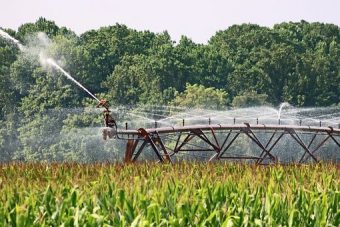
The European Bank for Reconstruction and Development is supporting Serbia’s efforts to upgrade its agricultural infrastructure and make it more climate resilient. A EUR 15 million EBRD loan will finance the construction of modern irrigation infrastructure in Vojvodina region, making agriculture in Serbia’s “breadbasket” more resistant to weather factors.
The financing will enable the introduction of efficient irrigation technology near Borkovac and Pavlovac reservoirs in Fruska Gora, as well as fresh water supply from the Sava River with restoration of the reservoirs ground. The new infrastructure will enable top-up irrigation during the peak dry season and provide sufficient water for around 3,500 hectares of land in the Ruma and Sremska Mitrovica municipalities, which is mostly covered by orchards and vineyards.
This is the second loan the EBRD is extending to the country for upgrades to its agricultural infrastructure, following a EUR 15 million loan in 2019 for the construction of irrigation services in Svilajnac and Negotin, scheduled for implementation in 2022.
Miljan Ždrale, Regional Head of Agribusiness, South East Europe, EBRD, said: “Building climate resilient infrastructure will allow the farmers in Vojvodina to better plan their production and with more security. Better access to irrigation services will also allow them to increase their expected crop yields and their income.”
As part of the project, the EBRD will help the Serbian Ministry of Agriculture, Forestry and Water Management to develop a new training programme on efficient irrigation technology for local farmers, also targeting women, with a view to increasing their employment potential and creating new job opportunities for them.
More:
The investment also entails the preparation of the first irrigation strategy in Serbia, aiming to ensure sustainable, demand-driven and efficient irrigation for enhanced and climate-smart agriculture. The national strategy, developed for a ten-year period, will be complemented by a five-year action plan and priority irrigation investments for the period until 2030. The assignment is implemented jointly with the Food and Agriculture Organisation of the United Nations (FAO). Formal approval of the Irrigation Strategy and the Action Plan is expected by mid-2022. Once adopted, the Strategy will pave the way to pursuing a meaningful reform agenda by improving efficiency in managing the irrigation sector and introducing more commercial principles.
Accounting for 9 percent of the country’s gross domestic product and 17 percent of employment, the agricultural and food-processing industry plays a vital role in the Serbian economy. However, the sector suffers from underinvestment and outdated technology, while water supply systems are often vulnerable to the impacts of climate change, such as drought, flooding or exceptionally harsh winters.
The EBRD is a leading institutional investor in Serbia. The Bank has invested more than EUR 6.9 billion in 296 projects in the country to date. The Bank’s focus in Serbia is on private-sector development, improving public utilities and facilitating the country’s transition to a green economy.
Source: EBRD



